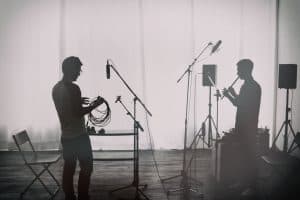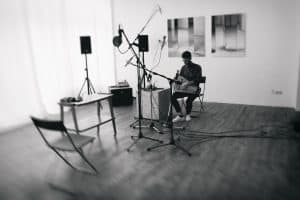AKPATOK ENSEMBLE
Dawid Adrjanczyk (shepherd instruments, prepared hurdy-gurdy, sound manipulation)
Nina Adrjanczyk (voice)
Akpatok is the minimalistic, meditative and experimental project by Dawid Adrjanczyk – an avant-garde performer, composer and sound artist, based in Kraków. His works often focus on the interaction between music and nature, archaic forms of sound experience, emptiness and stillness. Rooted in minimalism, he interprets the idiom of contemporary musical forms and the meditative potential of Early Music and Eastern European modality. His compositions and performances are mainly electro-acoustic. He combines traditional instrumentation, prepared guitar, vintage wind organs with electronic sound, field recordings and tapes. He also focuses on instrument preparations to explore unique tuning schemes and harmony based on micro-tonality and organic relationships of intervals.
A founder and a leader of the Akpatok Ensemble. He cooperates with The Magic Carpathians Project, with The Poor Diggers and with his wife Nina, with whom he performs archaic songs from Eastern Europe, as well as experimental freak folk compositions.
The new release by the Akpatok project, the album Two Winters, Two Springs, contains six minimalistic compositions by Dawid Adrjanczyk, recorded in mid-2015 for Low Clouds Records. By using consciously limited ways of expression and reducing the number of instruments and compositional structures, Adrjanczyk creates his works based on meditative idiom both with regard to particular compositions, as well as the album as a whole. Six sonic journeys through challenging paths invoke deep attentive listening and introduce the listener into a leisurely subdued rhythm of composition full of inner concentration, that is so characteristic of all the artist’s works.
During the recording session, the natural features of the instruments recorded were particularly to the fore, with the choice (hurdy-gurdy, shepherd bells, gongs) and the fully acoustic recording imbuing Two Winters, Two Springs with an exceptional material dimension.
“The path to complete minimalism still remains a path. I am deeply conscious of the limitations which are imposed on my art by the Western narrative tradition. Listening to my compositions attentively tends to be a difficult practice of observing how the sound persists and how it undergoes a continuous change.”
“I would like my compositions, built upon organic variability and inscribed in the cycle of permanent expansion/extinguishing of silence and sound as they are, to evoke not only concentration on the very substance of music, but through sensation, also purely physical in nature, to encourage the listener to focus attention on themselves. Because only within ourselves is reflected all that we hear and experience.”
PRESS
In his own words, the pieces here embark towards a total minimalism; as a composer his intention was to create an organic meditation on the physical phenomena of sound. This approach mirrors the aesthetic affect of the sounds themselves, which are far-flung from the mechanized din of civilization and look to the world in the absence of humankind for inspiration. A flock of geese sailing above a snow-blanketed valley, the wind sighing through the long grass: these are the atmospheres Adrjanczyk wants to evoke. Totally lovely and absorbing music– put an ear to the ground and surrender to the journey.
Steady drones start to throb as they rub against neighboring notes, until the whole thing starts to pulsate like an overactive heart, heaving and contracting in vague co-ordination. Quicker than I realise, simple actions start to trigger entire whirlpools of friction, resonance, texture and harmonic microcosm. It’s an unfathomably deep record – but only once I’m ready to hear it as such.
ATTN:Magazine
All tracks are based on foreground low bass delay and more and less intensive melodic movements in the background layers. We can say that the basic concept of reducing the amount of notes and their usage to three variants seemed somehow advanced but at the same time consistently respected. […] The composition Tree and Wind is perhaps the most modest one, the least spectacular, but the session with bells becomes a very rewarding time stimulating the imagination of the performers and listeners.
HIS VOICE Magazine
The aesthetic exhibited here is to simplify the compositional process by limiting the group’s musical vocabulary to that of the three aforementioned instruments. The hurdy-gurdy takes the fore on some tracks, laying down a subtle, multiphonic texture. The percussion plays a lead role on certain other tracks, evoking a primeval atmosphere. […] Akpatok’s “less is more” approach is certainly appealing, especially to those who prefer their music meditative, or in the Deep Listening vein.
Avant Music News



